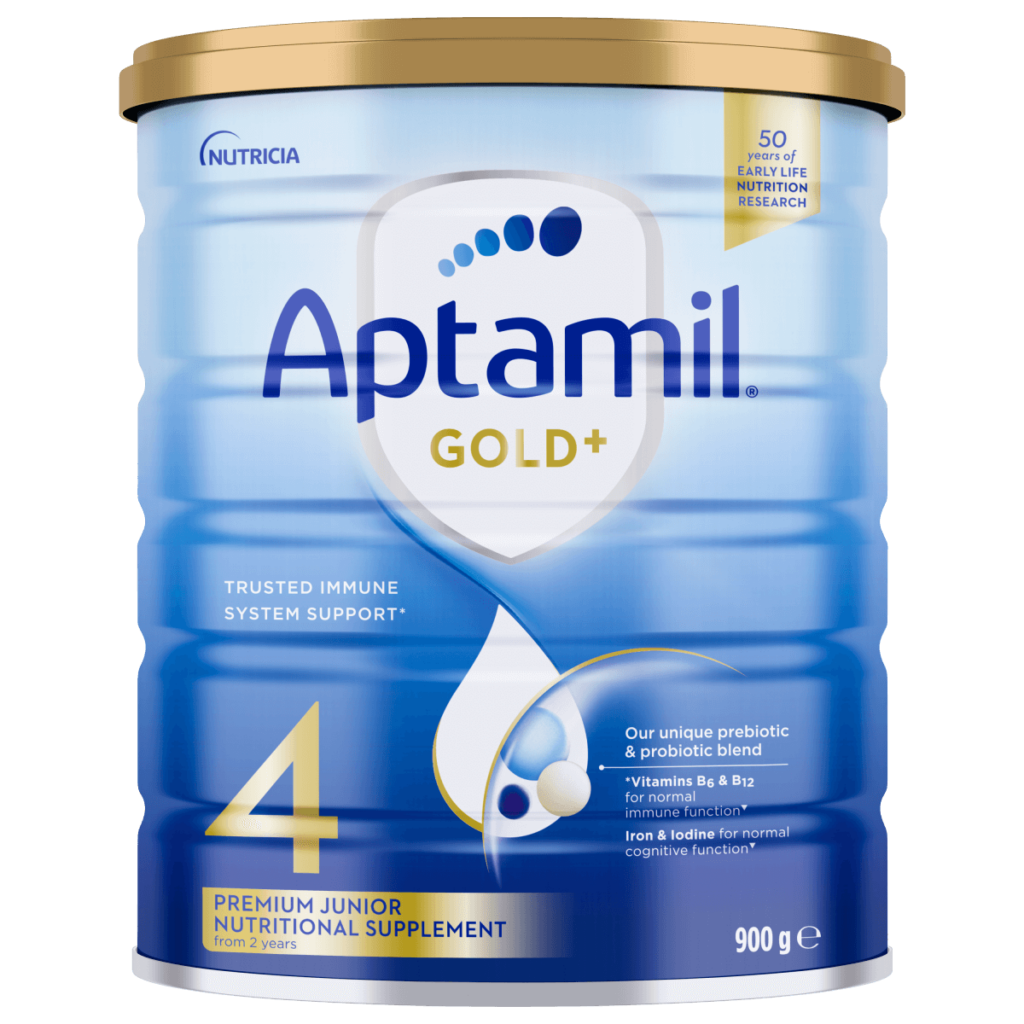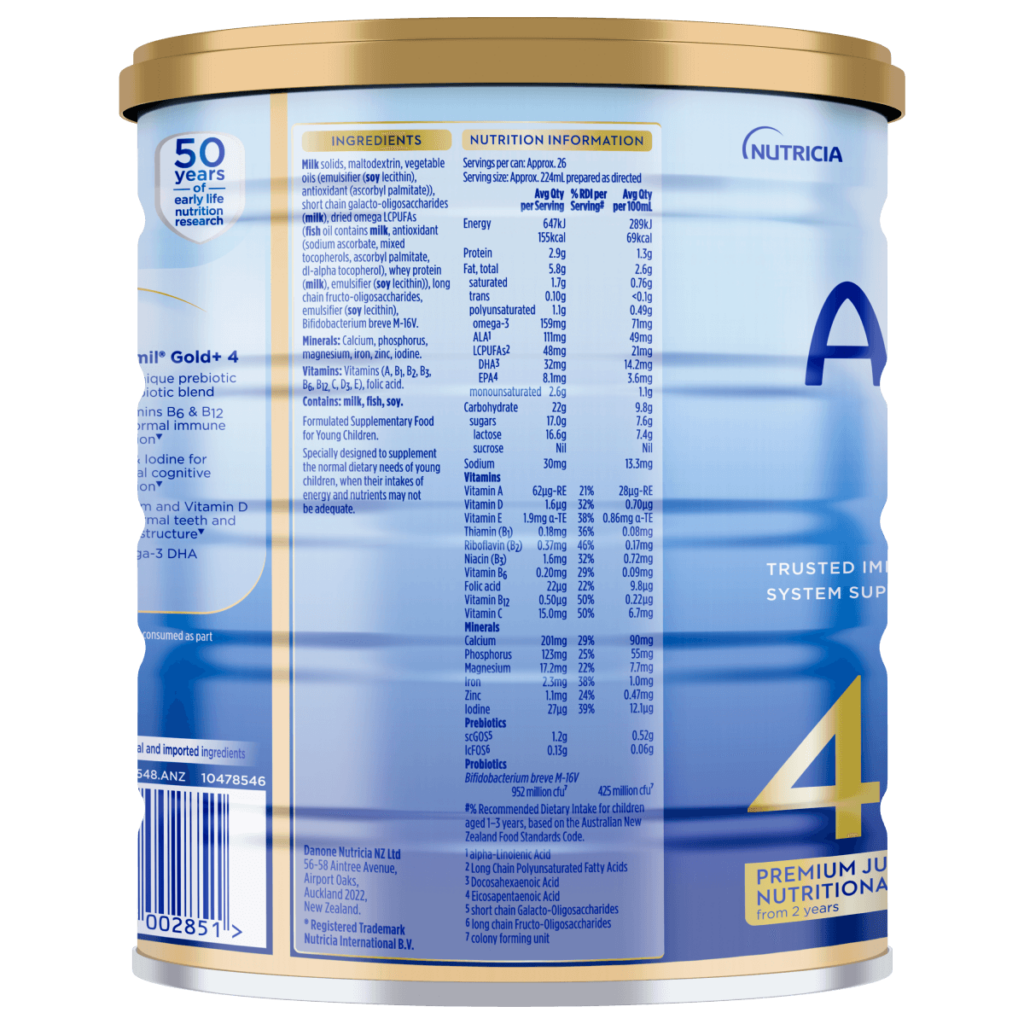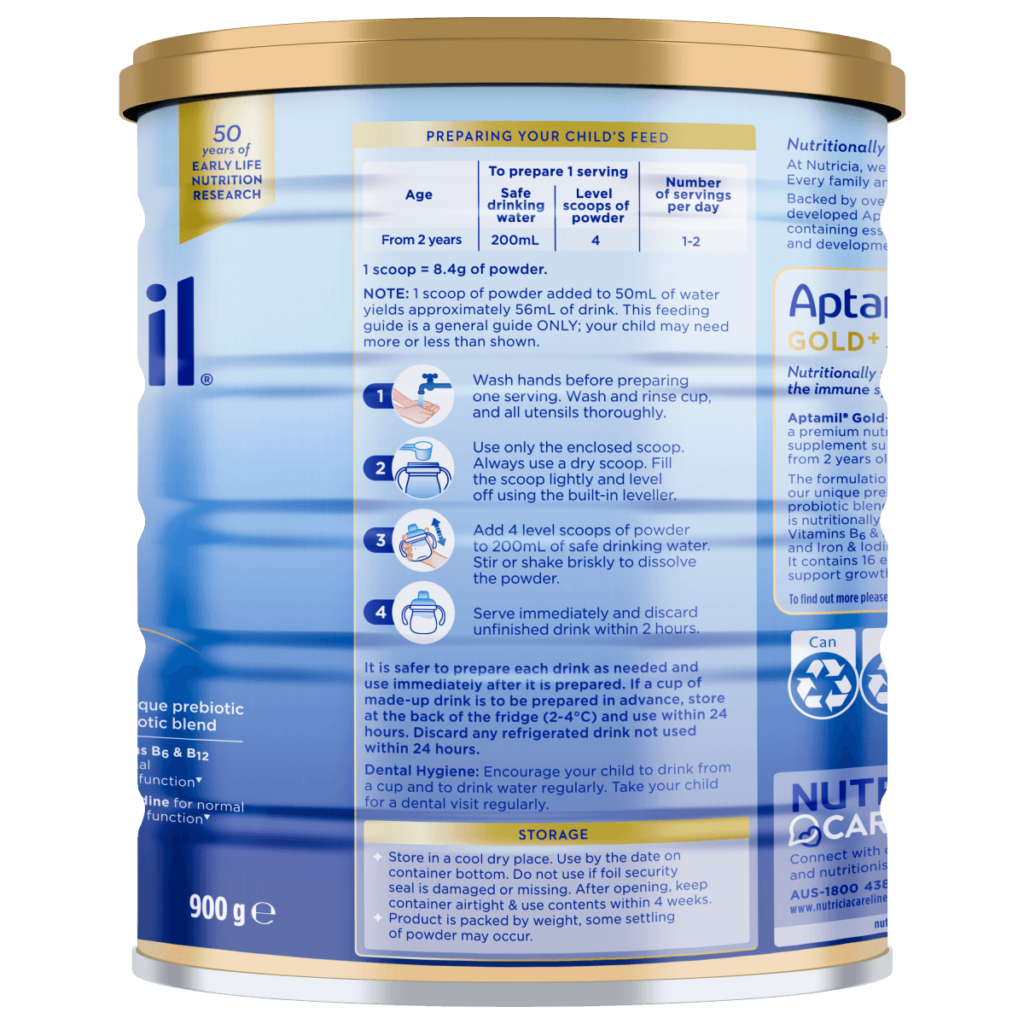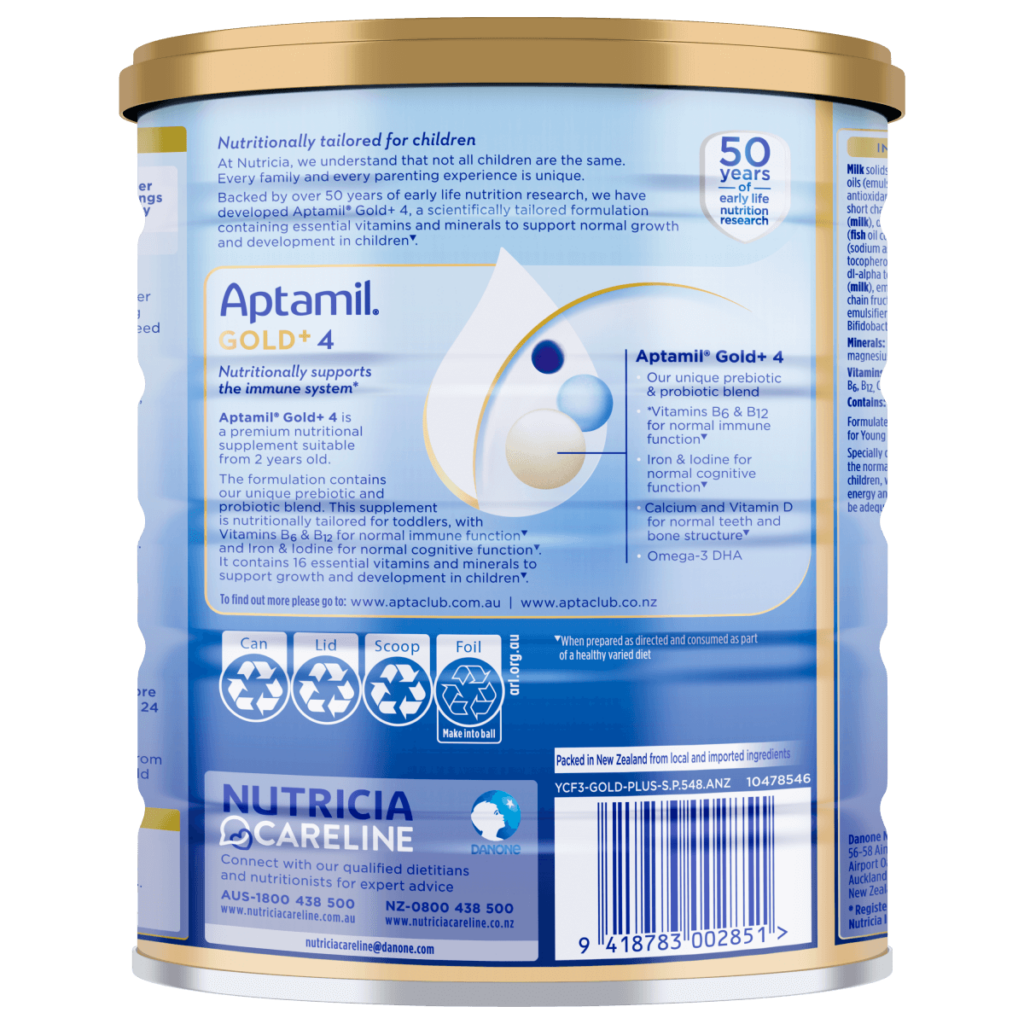



Product Information
A premium, dairy based toddler nutritional supplement, that nutritionally supports the immune system.1,2 Designed to help meet the dietary needs of toddlers from 2 years old whose nutritional intake may not be adequate.It contains no sucrose, is free from artificial colours and has a hint of vanilla flavour.
Features
Nutritionally supports the immune system
- Contains Nutricia’s patented blend of prebiotic oligosaccharides (90% scGOS*, 10% lcFOS**), 1.3g per 100mL which has been clinically shown to:
- Reduce the risk of infection in toddlers at day care, when combined with LCPUFAs.^1
- Significantly improves intestinal microbiota by increasing the percentage of bifidobacteria in healthy toddlers.1,2
- The goodness of cows’ milk plus other ingredients important for growth and development.
- Two serves per day provides at least 20–50% of the recommended dietary intake (RDI) of 16 essential vitamins and minerals.
- Omega-3 DHA+ (fish oil) may play an important role in brain, eye and nervous system development.3–5
- Calcium and vitamin D for normal teeth and bone structure.
Contraindications for use
Confirmed cows’ milk protein allergy, galactosaemia, lactose intolerance. Not suitable before 12 months of age.
Direction of Use
1. Wash hands before preparing one serving. Wash and rinse cup, and all utensils thoroughly.
Storage
- Store in a cool, dry place.
- Use by the date on bottom of the container.
- After opening, keep container airtight and use contents within four weeks.
- Some settling of the powder may occur.
Feeding Guide
| Age | Safe drinkings water | Level scoops of powder* | Number of servings per day |
|---|---|---|---|
| From 2 years | 200mL | 4 | 1-2 |
*1 scoop = 8.4g of powder. NOTE: 1 scoop of powder added to 50mL of water yields approximately 56mL of drink. This feeding guide is a general guide ONLY; your child may need more or less than shown.
Allergen and Cultural Information
Contains cows’ milk, fish and soy.
Nutritional Information
| Average contents | Avg Qty Per Serving | %RDI per Serving # | Avg Qty per Per 100mL |
|---|---|---|---|
| NUTRITION INFORMATION | |||
| Energy | 647 kJ | 289 kJ | |
| 155 kcal | 69 kcal | ||
| Protein | 2.9 g | 1.3 g | |
| Total Fat | 5.8 g | 2.6 g | |
| — Saturated | 1.7 g | 0.76 g | |
| — Trans | 0.1 g | <0.1 g | |
| — Polyunsaturated | 1.1 g | 0.49 g | |
| Total Omega 3 | 159 g | 71 g | |
| — ALA<sup>a</sup> | 111 mg | 49 mg | |
| — LCPUFAs^ | 48 mg | 21 mg | |
| — DHA<sup>b</sup> | 32 mg | 14.2 mg | |
| — EPA<sup>c</sup> | 8.1 mg | 3.6 mg | |
| — Monounsaturated | 2.6 g | 1.1 g | |
| Carbohydrates | 22 g | 9.8 g | |
| — Sugars | 17 g | 7.6 g | |
| — Lactose | 16.6 g | 7.4 g | |
| — Sucrose | Nil | Nil | |
| Sodium | 30 mg | 13.3 mg | |
| VITAMINS | |||
| Vitamin A | 62 μg-RE | 21 % | 28 μg-RE |
| Vitamin D | 1.6 μg | 32 % | 0.7 μg |
| Vitamin E | 1.9 mg | 38 % | 0.86 mg |
| Thiamine (B~1~) | 0.18 mg | 36 % | 0.08 mg |
| Riboflavin (B~2~) | 0.37 mg | 46 % | 0.17 mg |
| Niacin (B~3~) | 1.6 mg | 32 % | 0.72 mg |
| Vitamin B~6~ | 0.20 mg | 29 % | 0.09 mg |
| Folic acid | 22 μg | 22 % | 9.8 μg |
| Vitamin B~12~ | 0.50 μg | 50 % | 0.22 μg |
| Vitamin C | 15.0 mg | 50 % | 6.7 mg |
| MINERALS | |||
| Calcium | 201 mg | 29 % | 90 mg |
| Phosphorus | 123 mg | 25 % | 55 mg |
| Magnesium | 17.2 mg | 22 % | 7.7 mg |
| Iron | 2.3 mg | 38 % | 1.0 mg |
| Zinc | 1.1 mg | 24 % | 0.47 mg |
| Iodine | 27 μg | 39 % | 12.1 μg |
| PREBIOTICS | |||
| ScGOS* | 1.2 g | 0.52 g | |
| lcFOS** | 0.13 g | 0.06 g | |
| PROBIOTICS | |||
| Bifidobacterium Breve M-16V | 852 million cfu ^ | 380 million cfu |
# % Recommended Dietary Intake for children aged 1 – 3 years, based on the Australian New Zealand Food Standards Code.
b. Long Chain Polyunsaturated Fatty Acids
c. Docosahexaenoic Acid
d. Eicosapentaenoic Acid
Ingredients
900g Can: Milk solids, maltodextrin, vegetable oils (emulsifier (soy lecithin), antioxidant (ascorbyl palmitate)), short chain galacto-oligosaccharides (milk), dried omega LCPUFAs (fish oil contains milk, antioxidant (sodium ascorbate, mixed tocopherols, ascorbyl palmitate, dl-alpha tocopherol), whey protein (milk), emulsifier (soy lecithin)), long chain fructo-oligosaccharides, emulsifier (soy lecithin), Bifidobacterium breve M-16V.
Minerals: Calcium, phosphorus, magnesium, iron, zinc, iodine.
Vitamins: Vitamins (A, B1, B2, B3, B6, B12, C, D3, E), folic acid.
Contains: milk, fish, soy.
COUNTRY OF ORIGIN / PLACE OF MANUFACTURE:
Packed in New Zealand from local and imported ingredients
References
- Chatchatee et al. J Paed Gastro Nutr 2014; 58: 428–437.
- Rezaiki L et al. Presented at the International Symposium of Probiotics and Prebiotics in Paediatrics 2012.
- Koletzko B et al. J Perinat Med 2008; 36:5–14.
- Birch et al. Am J Clin Nutr 2010; 91:848–859.
- Innis S et al. J Pediatr Gastroenterol Nutr 2009; 48:S16–S24.
